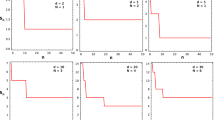Abstract
The evolution of reactive strategies for repeated 2×2-games occurring in biology is investigated by means of an adaptive dynamics.
Similar content being viewed by others
References
Aumann, R. J. (1981), Survey of repeated games, in R. J. Aumann et al. (eds.), Essays in Game Theory and Mathematical Economics in Honor of Oscar Morgenstern.
Axelrod, R. (1984), The Evolution of Cooperation, Basic Books, New York.
Axelrod, R. and Hamilton, W. D. (1981), The evolution of cooperation, Science 211, 1390–1396.
Axelrod, R. and Dion, D. (1988), The further evolution of cooperation, Science 242, 1385–1390.
Axelrod, R. (1987), The evolution of strategies in the iterated prisoner's dilemma in Davis, D. (ed.), Genetic Algorithms and Simulated Annealing, Pitman, London.
Boyd, R. and Lorberbaum, J. P. (1987), No pure strategy is evolutionarily stable in the Repeated Prisoner's Dilemma, Nature 327, 58–59.
Boyd, R. (1989), Mistakes allow evolutionary stability in the repeated prisoner's dilemma game, J. Theoret. Biol. 136, 47–56.
Donninger, C. (1986), Is it always efficient to be nice? in A., Dieckmann and P., Mitter (eds.) Paradoxical Effects of Social Behaviour: Essays in Honor of Anatol Rapoport, Physica, Heidelberg, pp. 123–134.
Eshel, I. and Motro, A. (1981), Kin selection and strong evolutionary stability of mutual help, Theoret. Population Biol 19, 420–433.
Feldman, M. and Thomas, E. (1987), Behavior-dependent contexts for repeated plays of the prisoner's dilemma II: Dynamical aspects of the evolution of cooperation, J. Theoret. Biol. 128, 297–315.
Hofbauer, J. and Sigmund, K. (1988), Dynamical Systems and the Theory of Evolution, Cambridge University Press.
Hofbauer, J. and Sigmund, K. (1990), Adaptive dynamics and evolutionary stability, to appear in Letters Appl. Math.
May, R. M. (1987), More evolution of cooperation, Nature 327, 15–17.
Maynard Smith, J. (1982), Evolution and the Theory of Games, Cambridge University Press.
Milinski, M. (1987), Tit for Tat in sticklebacks and the evolution of cooperation, Nature 325, 434–435.
Molander, P. (1985), The optimal level of generosity in a selfish, uncertain environment, J. Conflict Resolut. 29, 611–618.
Müller, U. (1987), Optimal Retaliation for Optimal Cooperation, J. Conflict Resolution 31, 692–724.
Nowak, M. and Sigmund, K. (1989a), Oscillations in the Evolution of Reciprocity, J. Theor. Biol., 137, 21–26.
Nowak, M. and Sigmund, K. (1989b), Game dynamical aspects of the Prisoner's Dilemma, J. Appl. Math. Comp. 30, 191–213.
Nowak, M. (1990), An evolutionarily stable strategy may be inaccessible, Theoret Population Biol. 142, 237–241.
Selten, R. and Hammerstein, P. (1984), Gaps in Harley's argument on evolutionarily stable learning rules and in the logic of TFT, Behavioural and Brain Sci. 7, 115–116.
Selten, R. (1975), Reexamination of the perfectness concept for equilibrium points in extensive games, Internat. J. Game Theory 4, 25–55.
Smale, S. (1980), The prisoner's dilemma and dynamical systems associated to non-cooperative games, Econometrica 48, 1617–1634.
Wilkinson, G. S. (1984), Reciprocal food sharing in the vampire bat, Nature 308, 181–184.
Author information
Authors and Affiliations
Rights and permissions
About this article
Cite this article
Nowak, M., Sigmund, K. The evolution of stochastic strategies in the Prisoner's Dilemma. Acta Appl Math 20, 247–265 (1990). https://doi.org/10.1007/BF00049570
Received:
Accepted:
Issue Date:
DOI: https://doi.org/10.1007/BF00049570




